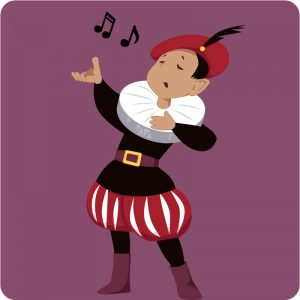
This Walking Classroom podcast talks about the beginning and development of the English madrigal in the late 1500’s. English madrigals started as translations of Italian songs and they developed into their own a capella secular style, which means the songswere sung without instruments and they were not religious songs. Madrigals covered a wide range of subjects, and there are still many groups that perform this type of music today.
Character Value: Keeping an open mind
Click for Standards Alignment
Common Core
L–Language | SL–Speaking and Listening | RI–Reading: Informational | RL–Reading: Literature | W–Writing | RH–6-8 Literacy in History/Social Studies | RST–6-8 Literacy in Science & Technical Subjects Elementary School:RI.3.2, RI.3.3, SL.3.1, SL.3.4
RI.4.2, RI.4.3, SL.4.1, SL.4.4
RL.5.9, RI.5.2, RI.5.3, SL.5.1, SL.5.4
Middle School:
RL.6.9, RI.6.2, RI.6.3, SL.6.1, SL.6.4
RI.7.2, RI.7.3, SL.7.1, SL.7.4
RI.8.2, RI.8.3, SL.8.1, SL.8.4
Supplemental Resource Links and Downloads
Quiz: (Make sure you're already logged into your Gmail account, then click to copy this Google form to your Google Drive. Quiz keys are here.)
Madrigals Google Quiz
Slide Deck:
Madrigals Slide Deck
A father and son duo perform an improvised song with just their mouths and voices.
Presents a 13th century rota performed by modern singers from Exeter University
Listen to an a cappella group perform madrigals from The King’s Singers.
Test knowledge about madrigals, Renaissance music, composers, and more with this Study.com practice quiz.
Research a madrigal composer of your choice (using the list provided in the article), then write a paragraph or short essay about his life and music.
Search for terms relating to madrigals.
Listen to this madrigal by Thomas Morley, sung by The King’s Singers, then draw a picture showing depicting any interesting images in the song.
See More Podcasts in Subject Area: Social Studies
See More Themed Groupings that Contain this Podcast: Middle Ages & Renaissance

